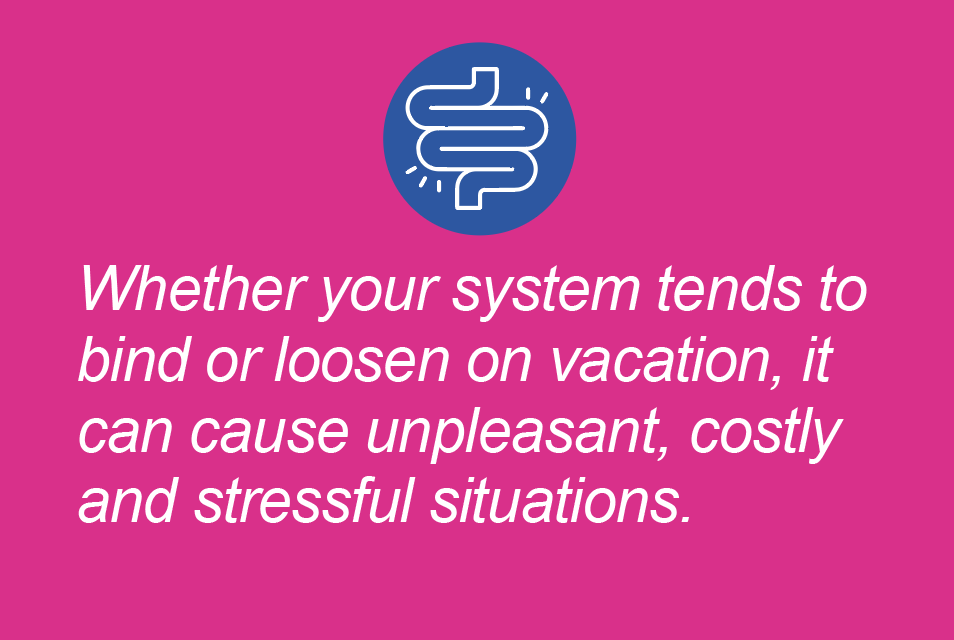Summer vacations are just around the corner! Whether it’s a road trip or heading off on an adventure tour, it’s a time to relax, have fun, soak up the sun and indulge in delicious food. But we all know tucking into rich, spicy local cuisine and/or sipping one too many creamy tropical cocktails can make our neurogenic bowels feel a little neglected or worse, overwhelmed. And this has the potential of completely ruining part, or all, of our holiday.
Savouring a warm baguette while wheeling the streets of Paris is hard to resist. But all that gluten has the potential of backing up our bowels for days (or more). While this might seem worth the sacrifice, constipation can contribute to low energy levels, abdominal discomfort, gas and/or urinary incontinence from the added pressure on our bladder. All of these consequences, especially the last, can dampen our travel experience.
Conversely, that peppery paella can quickly turn into a panicked speed wheel through the unfamiliar streets of Barcelona. This Spanish tummy may lock you in the loo for hours, or even days. These woeful washroom realities for us wheelchair users can result in missed (pre-paid) tours, scuba lessons, sunbathing on the beach or even flights home. This can not only be hugely disappointing after months of planning, with no availability for last-minute rescheduling, but also expensive.
Whether your system tends to bind or loosen on vacation, it can cause unpleasant, costly and stressful situations. Adding to this, upon returning home, it can take days to weeks to regain some semblance of balance to regular bowel programs. So, I wanted to share some practical tips and strategies on how to help prevent potential potty issues, keep things moving (manageably), decrease stress, as well as avoid extra costs without sacrificing the enjoyment of the local fare.
First, no matter where your destination is, stick to your regular bowel management routine as much as possible. Bowels love routine, but if you suddenly adopt a Mediterranean lifestyle and start eating dinner close to midnight, sleep in and switch your routine from morning to mid-day, your bowels might go rouge.
Next, plan ahead. Any vacation involves planning. You’ve put considerable time, effort and money into organizing your vacation, put the same energy into planning for your bowel program. If it’s been your dream to scuba dive at the Great Barrier Reef, book your dive on a non-routine day to avoid any possible mishaps in your wet suit in the middle of the Pacific Ocean. Planning also includes ensuring that you’ve packed all of your supplies. If you suddenly discover that you’ve left your laxatives at home while you’re unpacking, you’ll be scrambling to find the nearest pharmacy, and they may not carry your same brand or dosage. This can lead to intestinal irregularities or involuntaries. And this is not the way you want to start your trip.
Similarly, if you take nutritional supplements to help answer nature’s call, take them with you! Like medications, different destinations will not necessarily have the same products and changing these up can lead to undesirable effects. I recently drove to Key West for five weeks and made sure I packed my regular supplements. My friends laughed at my stock of healthy goods, but within days they were feeling “vacation constipation” and reaching for my hemp seeds to sprinkle in their smoothies.
Vacation Constipation can be an issue for any traveller regardless of age or ability. It happens for one or a combination of reasons such as changes in altitude, schedule, diet and stress levels (travel-related stress can be enormous for those of us who use mobility devices due to the risk of having our devices damaged or lost, resulting in loss of function, independence and possible health issues). Here are some ways how you can help prevent and/or relieve it.

1. Stay Hydrated
Dehydration slows the movement of waste through our intestines and contributes to hardening stool. Many people with mobility impairments, including myself, intentionally dehydrate themselves prior to and during flights because of the challenges with accessing tiny onboard washrooms. This, together with flying altitude is a perfect recipe for vacation constipation before your trip has even begun. To combat the risk of dehydration;
drink 500 ml of water as soon as you land and have access to accessible airport washrooms.
search online for major hotels or fast-food restaurants close to where you’ll be sightseeing. These facilities usually have accessible washrooms so you won’t have to dehydrate yourself all day.
in warmer climates, keep a water bottle handy while exploring. Consider drinking coconut water, which replenishes electrolytes lost when sweating.
2. Maintain Fibre Intake
Fibre is critical to the proper functioning of the large intestines and can help prevent or reverse constipation. When we’re travelling, we’re often tempted by new varieties of refined carbohydrate-rich foods – think pastries, Nann, croissants and pasta. While delicious, these high-carb foods are low in fibre. Enjoy them, but don’t go overboard. Have a couple of bites of the baguette instead of the whole thing. Then balance your intake with fibre-rich foods. Here’s some easy tips to increase your fibre intake;
- add hemp, ground flax or chia seeds to your breakfast smoothie or yogurt.
- pack fibre-ful travel snacks (such as nuts) to eat throughout the day.
- if at an Airbnb, stock your fridge with hummus and baby carrots.
- eat vegetables every day. Keep it simple – have a salad for lunch and a side dish of vegetables with dinner.
- when trying local breads and pasta, incorporate whole-grain versions.
3. Take Probiotics
A healthy balance of good bacteria in the intestines can enhance peristalsis and help prevent constipation;
- eat yogurt or kefir for breakfast several times a week.
- take a daily probiotic supplement (preferably ones that include Lactobacillus acidophilus and Bifidobacteria).
4. Take Omega 3 Fish Oils
These healthy fats help to soften stool;
- take 1-2, 1000 mg capsules (as with any supplement, consult with your healthcare provider before introducing).
5. Keep Moving
Holidays are a time when we tend to throw our regular exercise routines out, but physical activity helps keep things moving. Try to;
take daily, leisurely wheels on the boardwalk and explore the surrounding streets. These are relaxing ways to keep moving.
if you’re able and so inclined, rent a handcycle or go swimming!
You’re now equipped on how to keep things flowing, but what to do if things don’t stop flowing? Travellers’ Diarrhea from the introduction of new dishes and/or unfamiliar bacteria can wreak havoc on your travel plans. Here are some strategies to help prevent and manage this digestive dilemma.
1. Drink Alcohol in Moderation & Avoid Foods High in Processed or saturated fats.
Vacations are meant to be fun, but the introduction or excessive intake of ice cream, candy, chips, alcohol and greasy deep-fried foods are known to cause the scoots, which will suddenly have you propelling your chair at speeds you never thought possible.
- Be hyper-aware of what and how much you’re eating and drinking. Ask yourself if that extra Scotch egg is really worth it.
2. Know and Listen to your Body.
Part of the travel experience is trying new foods, but if you’re lactose intolerant at home, you’re still lactose intolerant in Rome. Skip the gelato.
3. Eat Foods That Bind.
If you’ve been spending more time sitting in the lavatory than the lounge chair, these foods can help bind you;
- bananas
- white bread/rice
- eggs
4. Make Sure You Have Good Travel Insurance.
A wheelie friend and seasoned traveller got sick while in Europe. The medications he was prescribed gave him a bad case of Travellers Diarrhea and subsequently, he had to miss his flight home. His insurance not only covered new flights home for him and his wife but also the extra nights in the hotel, cab fares and all other associated expenses.
So immerse yourself in new culinary traditions, and savour unique foods and flavours without worry. All it takes is a little planning, mindful eating, hydration, as well as a bit of fibre, probiotics and fish oils.


